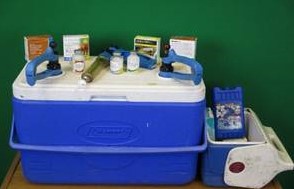
Agricultural News
Vaccine Handling and Maintenance with Brian Freking
Thu, 15 Sep 2022 09:02:06 CDT
 Brian Freking, SE District Extension Livestock Specialist, offers vaccine handling advice as part of the weekly series known as the "Cow Calf Corner" published electronically by Paul Beck. Today Freking is talking about ensuring veterinary vaccine product efficacy.
Brian Freking, SE District Extension Livestock Specialist, offers vaccine handling advice as part of the weekly series known as the "Cow Calf Corner" published electronically by Paul Beck. Today Freking is talking about ensuring veterinary vaccine product efficacy.
Studies from the University of Arkansas1, the University of Nevada2, and the University of Idaho3 have indicated that veterinary vaccine product efficacy is at risk due to improper handling and storage. Most animal vaccines require maintenance at refrigeration temperatures of 35-45?. Yet these studies showed that anywhere from 25% to 76% of refrigerators used for vaccine storage in the livestock industry failed to maintain these temperatures.
In addition, other improper handling and storage procedures, including exposing vaccine to ultraviolet light from the sun or to temperature extremes and using improper injection techniques, can render vaccine less efficacious or even useless. Livestock do not gain immunity from vaccines that are damaged, destroyed, or altered through improper handling and storage practices.
Two common types of vaccine are killed (K) and modified live (MLV). Killed vaccines are made by growing an organism that is inactivated or killed by utilizing chemicals or heat. Modified-live vaccines are made with a virus or bacterium that is attenuated, or weakened, so the organism will not cause disease in most healthy animals but will still stimulate immunity. Killed vaccines are considered safer but typically not designed for long term immunity. Modified-live vaccines need to be reconstituted as they are not stable in solution. Therefore, when mixing MLV you should use the product within 2 hours and kept cool thus the need for a cooler as a good management practice for storing syringe guns as shown. The advantage of MLV products is they generally promote a longer active immune response.
Refrigeration temperature monitors can be a good investment. Monitor and record temperatures at least weekly. Consider the age of the appliance and the location (barn, porch, or other storage areas) of the refrigerator. Refrigerator location can have a substantial impact on how efficiently the refrigerator operates. For example, a refrigerator kept in a non-insulated barn may be adversely affected by high and low ambient temperature extremes. These temperature extremes can damage products stored inside the refrigerator.
BQA Tips to remember:
1. Do NOT use vaccines that are or have been frozen
2. Never enter the vaccine bottle with a used needle
3. Practice good sanitation of equipment and the working environment
4. Triple rinse repeating syringes with boiling water and don’t use a disinfectant as this may inactivate vaccines following cleaning
5. Record product lot numbers, administration dates, and withdrawal times
6. READ AND FOLLOW LABEL INSTRUCTIONS
7. Maintain vaccination records for minimum of 3 years
WebReadyTM Powered by WireReady® NSI
Top Agricultural News
More Headlines...





